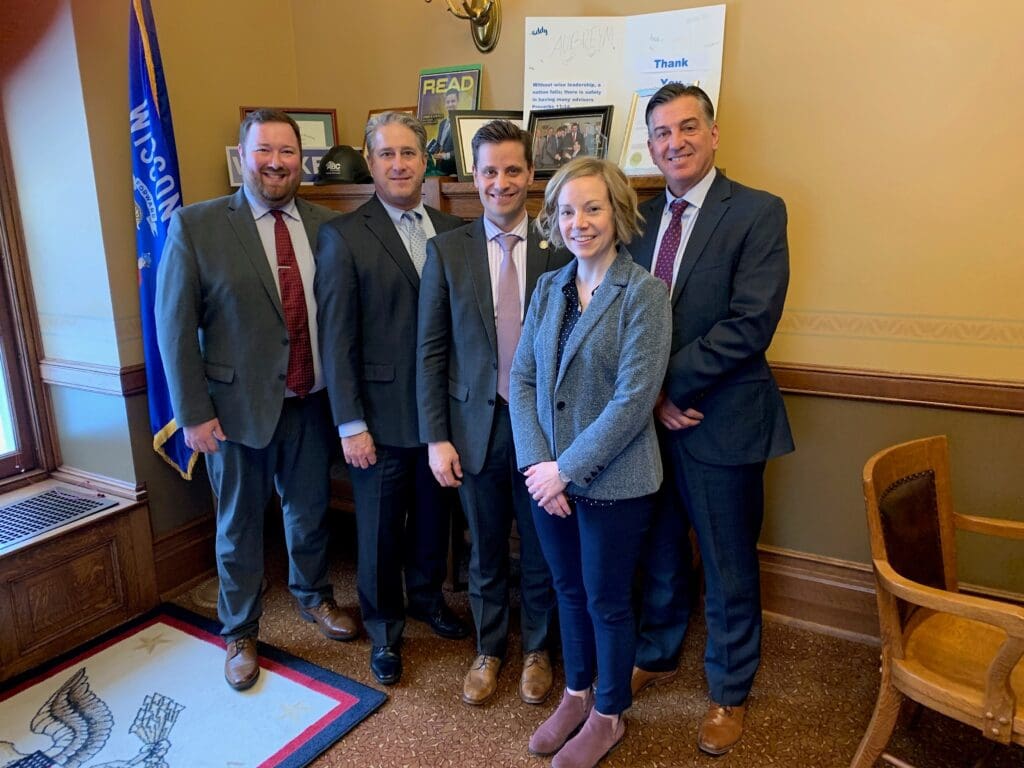

Last month, the Alliance and several of our member organizations and municipal partners participated in the Wisconsin Economic Development Association (WEDA) 2020 Legislative Day. The day brings together economic development professionals from around the state to advocate on important issues such as TIF, opportunity zones and workforce housing.
The day included discussion and advocacy on several important pieces of legislation:
AB 623 / SB 560 (TIF/TID): The Alliance opposes this bill, which limits the amount of cash grants to 20% of a Tax Incremental District’s (TID) total project costs. The cap would not apply if the development agreement specifies that the developer will finance the cost of public infrastructure improvements in the TID and will be reimbursed through cash grants. The bill also requires TIF project plans adopted by the governing Joint Review Board (JRB) to include alternative economic projections to highlight the potential financial scenarios in the event of more modest economic growth. It also clarifies that a majority vote of the 5 member JRB is 3 affirmative votes and requires a unanimous JRB vote for the following:
- Project plan amendments to expand the territory of the TID.
- Project plan amendments to keep the TID open longer than authorized under the current approved project plan.
Read more about the Alliance’s position on TIF here.
AB 532 / SB 440 (Opportunity Zones): The Alliance supports this legislation, which doubles the Opportunity Zones capital gains tax reduction at the state level for investors who invest in Wisconsin Qualified Opportunity Funds – which are required to hold at least 90% of their assets in Wisconsin Opportunity Zone projects. Under the bill, investors would receive a 20% state capital gains tax reduction if they hold an investment in a Wisconsin Qualified Opportunity Fund for at least five years, and a 30% reduction after seven years.
Workforce Housing
There was discussion of several bills related to workforce housing, including the following:
AB 544 / SB 484 (as amended by ASA 1 and SSA 1): The bill as amended would create a two-year, $10 million workforce housing pilot program administered by WHEDA to encourage the creation of single-family and multi-family workforce housing in rural Wisconsin counties. Under the program, WHEDA will award grants, loans, loan guarantees, or other forms of financial assistance to up to three communities in rural counties.
LRB-4317: Includes a number of provisions to spur workforce housing development at the local level, including:
- Increasing the amount of residential development permitted in a “mixed-use” TIF district to 60% of the district. Current law limits residential use to 35% of a mixed-use TIF.
- Expanding from one year to three years the length of time a community may extend the life of a TIF district for the purposes of increasing the amount of workforce housing in the community.
- Allowing communities to exempt workforce housing development from local impact fees.
LRB-2128: Would create a sales tax exemption for building materials, supplies and equipment purchased for the construction of workforce housing. The bill defines workforce housing as 1) Housing intended for initial occupancy by individuals whose household income does not exceed 120% of the county’s gross median income; or 2) Housing that costs the occupants no more than 30% of the county’s media income.
The day included legislative briefings, an update from Wisconsin Housing and Economic Development Authority (WHEDA) CEO and executive director Joaquín Altoro and statehouse visits with area legislators. The Alliance is pleased to partner with WEDA on several important economic development issues that affect both organizations. Read more about WEDA’s legislative priorities here.
Share on Social Media
Recent News
Sign up for newsletter updates
